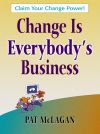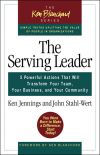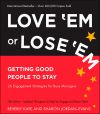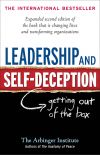Правообладателям!
Представленный фрагмент книги размещен по согласованию с распространителем легального контента ООО "ЛитРес" (не более 20% исходного текста). Если вы считаете, что размещение материала нарушает ваши или чьи-либо права, то сообщите нам об этом.Читателям!
Оплатили, но не знаете что делать дальше?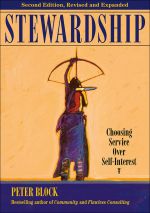
Текст бизнес-книги "Stewardship. Choosing Service Over Self-Interest"
Автор книги: Peter Block
Раздел: Зарубежная деловая литература, Бизнес-книги
Возрастные ограничения: +12
Текущая страница: 1 (всего у книги 2 страниц)
Peter Block
Stewardship
More praise for the new edition of Stewardship
“Be forewarned: this is a scary read. In the twenty years I have been engaged in collaborative leadership programs, Peter has been a go-to author for challenging the theory and practice of leadership. In this second edition of Stewardship, Peter leaves us nowhere to hide as he takes an in-depth look at what it truly means to lead from the heart in a culture driven by accountability, metrics, and control. Every ‘yes but’ I raised is countered with examples, metaphors, skillful explanation, case studies, quotes, practical suggestions, and Peter’s trademark creativity and faith in our ability to do the right thing for the common good.”
– Anne J. Udall, Trustee, American Leadership Forum (ALF); former Director, Charlotte Region Chapter, ALF; and Vice Chair, Udall Foundation
“Like Robert Greenleaf before him, Peter Block’s voice is that of a contemporary prophet. This revised edition of Stewardship is one of the best books ever written. It serves as a powerful source of hope and encouragement for servant-leaders everywhere.”
– Larry C. Spears, coauthor of Insights on Leadership, The Spirit of Servant-Leadership, and Fortuitous Encounters
“Over the past forty years, through Stewardship and other seminal works, Peter Block has articulated the course required for effective leadership in the 21st century. If only more managers and leaders from every sector took note and practiced the principles of stewardship– productivity would rise, people would be healthier, local community life would be flourishing, and the spirit of democracy would be enlivened worldwide. His message is that essential and that scalable.”
– Lynn Luckow, President and CEO, LikeMinded.org, and former President and CEO, Craigslist Foundation
“Stewardship is love in action. It is time for our organizations to rethink how they exercise power and control. In our changing country and world, our capacity for stewardship may be what ultimately saves our democracy and models accountability and freedom, in their real sense, for the rest of the world. As usual, Peter Block points us in the direction of our better selves, living out a better future.”
– Sayra Pinto, Principal, Matriz Coaching & Consulting
“This is one of those very rare anomalies: a second edition that is more essential and timely than the first. It spotlights our current dysfunctionalities – such as the literal looting of so many of our organizations by self-serving top levels – and how far we have actually regressed from a pattern of commitment to service and healthy work environments in most corporations. It’s impossible to read this book and then continue to look at current organizational processes as (desirable) ‘business as usual.’”
– Fritz Steele, organizational and environmental consultant and coauthor of The Arrogant Leader
“As with his other books, the second edition of Stewardship forces the reader to rethink basic assumptions about leadership and change in organizations. Peter always challenges my thinking and offers a perspective that I have never found elsewhere. He makes espoused values come alive. Leading in the way Peter describes requires courage, a virtue missing in many of today’s organization leaders. Peter’s unique ability to pinpoint the true source of power and confront the reader in a way that cuts through defenses makes reading Stewardship a true learning and growth experience.”
– Cliff Bolster, Leadership and Learning Consultant, Bolster & Associates, Inc.
“Peter Block is one of the most provocative and iconoclastic thinkers we have on the topics of leadership, business, and organizational design. His insights are still fresh and razor sharp, and he expresses them in a singular, poetic style. The new edition of this foundational text extends the scope of his insights to meet the challenges that have arisen in the last twenty years and shows how to create not just productive and humane workplaces but vibrant communities, an engaged democracy, and a healthy planet.”
– Toni A. Gregory, EdD, Associate Dean for Academic Affairs, PhD Program in Interdisciplinary Studies, Union Institute & University
“Peter Block’s second edition of Stewardship is even more provocative than the first edition was twenty years ago because we are more fearful about our economic and personal well-being than ever before. Block helps us see our own complicity and interconnectedness with all that goes on around us and, with this updated edition, will help a new generation learn that the way to find meaning and purpose in life is to form partnerships for the common good, empower each other through human understanding, and together, build competent societies.”
– Frances Strickland, PhD, President, Smith Educational Enterprises
Also by Peter Block
The Abundant Community:
Awakening the Power of Families and Neighborhoods,
co-authored with John McKnight
Flawless Consulting:
A Guide to Getting Your Expertise Used,
Third edition coauthored with Peter Koestenbaum
Community: The Structure of Belonging
The Answer to How Is Yes:
Acting on What Matters
The Flawless Consulting Fieldbook and Companion:
A Guide to Understanding Your Expertise
Freedom and Accountability at Work:
Applying Philosophic Principles to the Real World,
The Empowered Manager:
Positive Political Skills at Work
To Leyland, Gracie, and Auggie, my grandchildren
Each a uniquely beautiful soul
Knowing them assures me that they will create
a better world than the one they inherited
and
To Leslie Stephen, my always editor and friend
She is a dream to work with: honors my voice,
holds to the intent, performs alchemy with words
After her touch, the writing is clearer and
kinder to the reader and to me
This revision does not exist without her
Foreword
by Steven Piersanti
MY PUBLISHING CAREER has spanned more than thirty-five years. For thirty of those years I have been an acquiring editor, and I have served as the lead editor for many hundreds of books. Yet this is the first time I have ever written the foreword for a book.
Why have I chosen to do something for this book that I have never done before? Two reasons. First, as a testament to the importance of this book. And second, because of gratitude for the profound impact of this book on Berrett-Koehler Publishers and on me personally.
Stewardship was published to great acclaim in 1993, and it quickly became a best seller, eventually selling nearly 200,000 copies. Library Journal (June 15, 1993, p. 92) said that “Block transcends all extant leadership literature” and this book “[has] conceived the organizational structure of the 21st century.” Stewardship inspired thousands of leaders and change agents to profoundly rethink how they did their daily work. For example, one educational administrator wrote (in a letter to Peter Block), “I will never look at leadership and organizations the same way again.. I have read the book, reread it, highlighted it, read my highlights, and taken notes on my highlights.” Hundreds of other book authors and change agents were so influenced by Stewardship that they incorporated ideas from it in their work, thereby further spreading its influence. Some of them wrote their own books (such as Abolishing Performance Appraisals and The Future of Staff Groups) that delved deeper into particular themes of Stewardship. And Peter Block expanded the last chapter of Stewardship into an equally profound book, The Answer to How Is Yes.
Block has added fascinating and important new material in this second edition: a new introduction that surveys, with Block’s compelling insight and mind-opening perspective, what has changed and what has not changed in the world in the past twenty years – and how the ideas in this book are needed now more than ever; a new chapter on “stewardship for the common good” that shows how the principles in the book apply not just to individuals and organizations but also to communities and to society in general; and new examples of stewardship in action.
But this new material is just icing on the cake. What I especially love about Stewardship is that it is the rare book that is just as relevant and radical today as it was the day it was written, or even more so. This is a sign that Peter Block hit bedrock with the concepts in this book.
One can open the book almost anywhere and find pithy, memorable observations that turn conventional thinking on its head and open our minds to new ways of seeing the world around us. Consider, for example, this comment in chapter 12, “Cosmetic Reform: When the Disease Becomes the Cure”: “Appraisal is a process of coercion. We also call it a reward system. Yet if it is a reward system, it is a punishment system too.”
Block provides such a foundational and far-reaching rethinking of leadership, power, purpose, governance, and participation in organizations and communities that the ideas of this book will continue to change our thinking for decades to come. The book’s original and central concepts – stewardship, partnership, service, avoiding class systems, and many others – are so profound and universally relevant that they will challenge readers’ beliefs and practices in any place and time, now and in the future.
Berrett-Koehler is unusual as a publishing company because we consciously and actively seek to learn from the books we publish and to use the ideas in those books to improve how we run our business, serve our customers, partner with authors, and work with all of our stakeholders. Without any doubt, Stewardship has had more impact on Berrett-Koehler than any other of the more than five hundred books we have published.
For twenty years I have given each new BK employee a copy of Stewardship and asked her or him to read it. But that is only the tip of the iceberg of this book’s influence on our company.
Its influence started in 1992, even before Stewardship was published, when I was working with Peter Block on the manuscript and sought to incorporate its ideas into how Berrett-Koehler was conceived and organized. In fact, the founding concept of Berrett-Koehler was based on stewardship, as described in our first catalog in the spring of 1992:
If I were to choose one word to describe our vision, it would be “stewardship.” By this I mean a deep sense of responsibility to administer the publishing company for the benefit of all of our “stakeholder” groups – authors, customers, employees, suppliers and subcontractors, owners, and the societal and environmental communities in which we live and work. Each of these groups contributes to the success of our publishing venture, and each has a “stake” or investment in its success, whether that investment is time, talent, money, or other resources.
This is still our guiding concept today for all that we do at Berrett-Koehler.
There is a story behind why the ideas of Stewardship fell on such fertile ground at Berrett-Koehler. Before founding BK, I had been president of Jossey-Bass Publishers in San Francisco during its challenging transition from being an independent company to becoming part of the media empire of Robert Maxwell (who at the time was a chief rival of Rupert Murdoch) and being placed as a division of Maxwell Communications Corporation.
I quickly discovered that our new corporate parent was calling all the shots, and none of the other Jossey-Bass stakeholders really mattered. Not the many Jossey-Bass employees who had been central to the company’s success for ten to twenty years of faithful employment there; not the authors with whom Jossey-Bass had longstanding relationships, some of whom were original authors of the company; not the many suppliers and service providers on whom the company depended, including some who had supported the company from its founding. All that really mattered was the call from my boss in New York City – a bureaucrat who seemed to have no real understanding of our company or even how to work collaboratively and intelligently with us.
What was especially troubling about this new balance of power was that there was nothing our new corporate parent was doing that made Jossey-Bass more successful or productive or profitable. Yet, without adding any value, the corporate parent presumed to unilaterally govern our company. It was easy to see that something was deeply wrong with this equation.
And so the ideas in the Stewardship manuscript spoke directly to my corporate experience. We set out to build Berrett-Koehler Publishers on a different foundation. This started with the founding concept quoted above and was later reinforced by our articulation of our mission as “Creating a World That Works for All.” It has continued with a host of BK practices directly inspired by the concepts in Stewardship.
One of these core practices is to avoid a class system in our management, employment, and compensation practices. This begins with involving all employees (and, when appropriate, other stakeholders) in making major company decisions. And whereas, as Block writes in Stewardship, most organizations have two compensation systems, with the executive compensation system designed to pay those at the top as much as possible and the employee compensation system designed to control costs, Berrett-Koehler has just one compensation system for everyone in the company. Furthermore, this compensation system is designed to pay a living wage to everyone and to minimize the disparity between the lowest and highest paid employees; accordingly, the highest paid employee (me) earns less than five times what the lowest paid full-time employee earns, including bonuses. All employees are involved in decisions about changes in the compensation system. And we have taken another page out of Stewardship by banishing secrecy: all employees know where every employee is on the compensation scale, and all employees receive full financial reports each month of how the company is doing and where money is being spent.
Another area where Berrett-Koehler has sought to live by the ideas in Stewardship is by following a partnership approach in our relationships with authors. This approach struck pay dirt right from the beginning of our company with our distinctive publication agreement, which, in the words of one early observer, “creates incentives for both parties to contribute and do well, whereas most contracts are contingencies for when things go wrong, legal protection against foul-ups.” The publication agreement gives authors more involvement in deciding the title, cover design, and interior design of the book than is normally the case in the publishing world. Various other clauses in the agreement also support a partnering relationship with authors in lieu of the publisher control clauses in most agreements. And most radical of all, the agreement yields to authors the ultimate power by giving them the right to terminate the agreement “if, for any reason, the Author is not satisfied, in the Author’s sole judgment, with any aspect of the relationship with the Publisher or with the Publisher’s performance in any aspect of publishing and selling the Work.” This turns on its head the normal hierarchy between publishers and authors.
We have developed many other practices over the years to support a partnering relationship with authors, including launching each new book with an “Author Day” that allows authors to interact with our entire staff and to work directly with our editorial, design and production, sales and marketing, and digital community building teams; supporting the growth of the “BK Authors Cooperative,” which is an independent organization through which BK authors help each other in numerous ways to increase their success and impact; and creating a groundbreaking “Bill of Rights and Responsibilities for BK Authors.” These partnering practices and many others are major contributors to Berrett-Koehler’s success and are why many view BK as one of the most author-friendly publishers.
We approach relationships with other stakeholder groups with a similar partnering approach. This starts with the ownership of our company by our employees, authors, customers, suppliers, service providers, sales partners, and other stakeholders. All these groups are included in our strategic planning processes and our occasional “BK Community Dialogues.” And our board of directors includes representatives of all these groups. This has led to great support for Berrett-Koehler by our stakeholders throughout our company’s history, including during challenging economic times.
So we at Berrett-Koehler know from abundant firsthand experience that the ideas in Stewardship are powerful and effective in creating meaning, contribution, and success for an organization or community.
It is my hope that every leader, every aspiring leader, every change agent in any group, and every member of the BK community will read this book. I know that all who do so and who seek to incorporate these concepts in their life and work will be richly blessed and increase their capacity to do good in the world.
Steven PiersantiPresident, Berrett-Koehler Publishers
Welcome
OUR TASK IS TO create organizations that work, especially in a world where everything constantly seems up in the air. We know that fundamental change is required. We keep talking about cultural change, but this will not be enough if we stay focused on changing attitudes and skills. No question that beliefs and attitudes need to change, but unless there is also a shift in governance – namely, how we distribute power and privilege and the control of money – the efforts will be more cosmetic than enduring.
The need for something different partly grows out of us as individuals. There resides in each of us the desire to more fully integrate our lives. We must feel fragmented, because we talk about ourselves as if we were cats with several lives. “This is my work life,” “This is my personal life,” “This is my spiritual life.” In compartmentalizing our lives, we are constantly setting aside parts of ourselves, even at times giving ourselves away. This fragmentation is also reflected in our organizations. There are all the debates between being people oriented and task oriented, hard-nosed and soft-nosed, values driven and results driven.
The central idea of this book, stewardship, has the potential for us to reintegrate parts of ourselves and move beyond the debates in our organizations. In this way, it is a book of reconciliation. Stewardship focuses our attention on aspects of our workplaces that have been most difficult to change: the distribution of power, purpose, and rewards. It is these dimensions of organizations that need to be re-formed if we are to become whole in our efforts to strengthen ourselves. We are each engaged in discrete exercises to help our organizations lose weight, become more flexible, and stay hopeful. We have a program for everything. Cost reduction, continuous improvement, customer service, cycle time, empowerment. Each one seems to meet its goals, yet a major part of our lives stays unchanged. We remain watchful of people who have power over us; we feel that the organization is the creation of someone other than ourselves and that the changes we want to make still need sponsorship and permission from others at a higher level.
We need a way of reconciling the promise of our programs with the experience of our day-to-day lives so that the Queen Mary truly changes direction.
Stewardship
Stewardship is the umbrella idea that promises the means of achieving fundamental change in the way we govern our institutions. Stewardship is to hold something in trust for another. Historically, stewardship was a means to protect a kingdom while those rightfully in charge were away, or, more often, to govern for the sake of an underage king. The underage king for us is the next generation. We choose service over self-interest most powerfully when we build the capacity of the next generation to govern themselves.
Stewardship is defined in this book as the choice to preside over the orderly distribution of power. This means giving people at the bottom and the boundaries of the organization choice over how to serve a customer, a citizen, a community. It is the willingness to be accountable for the well-being of the larger organization by operating in service, rather than in control, of those around us. Stated simply, it is accountability without control or compliance.
Правообладателям!
Представленный фрагмент книги размещен по согласованию с распространителем легального контента ООО "ЛитРес" (не более 20% исходного текста). Если вы считаете, что размещение материала нарушает ваши или чьи-либо права, то сообщите нам об этом.Читателям!
Оплатили, но не знаете что делать дальше?![Книга Search Inside Yourself: Increase Productivity, Creativity and Happiness [ePub edition] автора Jennie Miller](http://biznes-knigi.com/books_files/covers/thumbs_100/search-inside-yourself-increase-productivity-creativity-and-happiness-epub-edition-11788.jpg)


